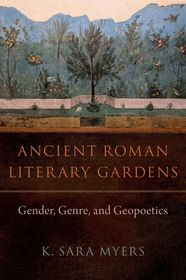
Ancient Roman Literary Gardens
Gender, Genre, and Geopoetics
-
10% KEDVEZMÉNY?
- A kedvezmény csak az 'Értesítés a kedvenc témákról' hírlevelünk címzettjeinek rendeléseire érvényes.
- Kiadói listaár GBP 59.00
-
28 187 Ft (26 845 Ft + 5% áfa)
Az ár azért becsült, mert a rendelés pillanatában nem lehet pontosan tudni, hogy a beérkezéskor milyen lesz a forint árfolyama az adott termék eredeti devizájához képest. Ha a forint romlana, kissé többet, ha javulna, kissé kevesebbet kell majd fizetnie.
- Kedvezmény(ek) 10% (cc. 2 819 Ft off)
- Kedvezményes ár 25 369 Ft (24 161 Ft + 5% áfa)
Iratkozzon fel most és részesüljön kedvezőbb árainkból!
Feliratkozom
28 187 Ft

Beszerezhetőség
Becsült beszerzési idő: A Prosperónál jelenleg nincsen raktáron, de a kiadónál igen. Beszerzés kb. 3-5 hét..
A Prosperónál jelenleg nincsen raktáron.
Why don't you give exact delivery time?
A beszerzés időigényét az eddigi tapasztalatokra alapozva adjuk meg. Azért becsült, mert a terméket külföldről hozzuk be, így a kiadó kiszolgálásának pillanatnyi gyorsaságától is függ. A megadottnál gyorsabb és lassabb szállítás is elképzelhető, de mindent megteszünk, hogy Ön a lehető leghamarabb jusson hozzá a termékhez.
A termék adatai:
- Kiadó OUP USA
- Megjelenés dátuma 2024. december 23.
- ISBN 9780197773208
- Kötéstípus Keménykötés
- Terjedelem312 oldal
- Méret 237x164x24 mm
- Súly 599 g
- Nyelv angol 733
Kategóriák
Rövid leírás:
Through an analysis of ancient garden studies and close readings of major Latin texts from the first centuries BCE and CE, K. Sara Myers examines the function and representation of garden descriptions in the work of a broad range of Roman authors, such as Cicero, Catullus, Vergil, Varro, Horace, Ovid, Petronius, Columella, Statius, and Pliny the Elder and Younger.
TöbbHosszú leírás:
Gardens are not central in Latin literature, but usually somewhere off to the side, as was often the real garden. They appear, however, in some form in nearly all literary genres of Latin literature--history, satire, epigrams, epics, letters, lyric poetry, elegies, and novels--and often edge their way into larger socio-economic and political discussions about Roman identity, gender, wealth, and land use. Through an analysis of ancient garden studies and close readings of major Latin texts from the first centuries BCE and CE, K. Sara Myers examines the function and representation of garden descriptions in the work of a broad range of Roman authors, such as Cicero, Catullus, Vergil, Varro, Horace, Ovid, Petronius, Columella, Statius, and Pliny the Elder and Younger.
While most of the sources in this study are poetic and their gardens fictional, it is still important to situate these works in their cultural and historical contexts. By understanding how to interpret the importance of these spaces in the literature in which they appear, readers will not only better comprehend the aesthetic and ethical values of the work in question, but they will also gain a better insight into ancient Roman attitudes toward gender, art, and human relationships with nature. Myers shows how some Romans constructed the garden as a space under male control: Men are cultivators, while women are cultivated. Literary gardens can symbolize a range of positive masculine ideals and identities for elite men--from the rustic farmer to the philosopher--but can also represent unmanly luxury and leisure. Women in gardens are usually sexualized, depicted as virginal or sexually transgressive, especially when they attempt to express ownership over these spaces. In almost all these texts, the artificial and artistic arrangement of the raw material of nature invites self-reflexivity, which Myers calls "geopoetics," or a "poetics of the earth."
This attractive book treats the rich topic of gardens, a significant theme in Latin literature, and illumines some key central texts with acute and rewarding analysis; its interests in gender, genre, and garden studies also make it impressively contemporary and interdisciplinary.
Tartalomjegyzék:
Introduction: Gardens, Gender, Genre, Geopoetics
Masculine Horticultural Self-Fashioning: Hard and Soft Labor
Vergil's Garden (Georgics 4.116-48): A Literary Paradigm
Women in the Garden: Catullus, Ovid, and the Greek Poetic Tradition
Trampling in the Garden: Satiric Verse and Epigram
Columella and the Poetics of Horticulture
Conclusion and Epilogue




